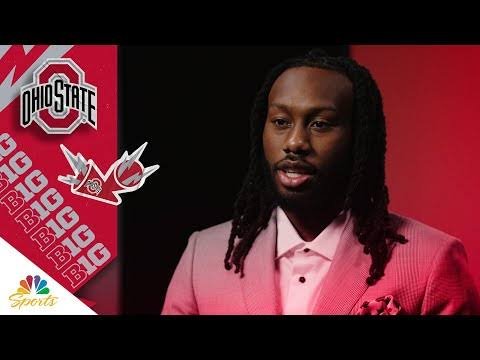Bruce Thornton Stands Firm: Ohio State Star Rejects NIL Deal Worth Millions, Prioritizes Legacy Over Cash
In an era where college athletes are cashing in on Name, Image, and Likeness (NIL) opportunities, Ohio State basketball star Bruce Thornton has chosen a path less traveled. The sophomore guard, known for his leadership on the court, recently turned down a multi-million-dollar NIL deal, citing a deeper commitment to his values, team, and legacy.
Thornton’s decision has drawn widespread attention and sparked conversations about the role of money in collegiate sports. While NIL deals have provided athletes with life-changing financial opportunities, Thornton’s choice highlights the fact that not every athlete is swayed by monetary incentives.
### A Rising Star at Ohio State
Bruce Thornton, a former four-star recruit, burst onto the college basketball scene as a freshman. His poise, court vision, and defensive tenacity made him a standout player in a competitive Big Ten conference. By the end of his debut season, Thornton had established himself as the Buckeyes’ floor general, earning praise from coaches, teammates, and analysts alike.
As a sophomore, Thornton’s influence has only grown. With averages of 14.3 points, 5.1 assists, and 4.2 rebounds per game, he has become a cornerstone for Ohio State’s rebuilding efforts. His maturity and work ethic have not only made him a leader on the team but also an attractive prospect for brands seeking to partner with high-profile athletes.
### The NIL Offer
According to sources, the lucrative NIL deal Thornton declined would have secured him financial stability for years to come. The offer reportedly came from a prominent sportswear company and included cash incentives, endorsements, and personal branding opportunities.
Thornton, however, remained steadfast in his priorities. “Money can come and go, but my legacy and what I stand for are things I can’t compromise,” he reportedly said during a team meeting. “I’m here to represent Ohio State and be the best player and teammate I can be.”
### Prioritizing Team and Legacy
Thornton’s decision reflects his upbringing and the values instilled in him by his family. Known for his humility and discipline, he has often credited his parents and coaches for teaching him the importance of integrity and hard work.
For Thornton, rejecting the NIL deal was not about dismissing the value of money but about staying true to his goals. “I want to be remembered as someone who gave everything to the game and my team. The money will come when the time is right,” he shared in a recent interview.
His teammates and coaches have expressed their admiration for his decision. Ohio State head coach Chris Holtmann called Thornton’s choice “a reflection of his character and commitment.” Holtmann added, “Bruce is the kind of player every coach dreams of—someone who leads by example and puts the team first.”
### The Broader Impact
Thornton’s stance has resonated with fans and athletes alike. While many college athletes have embraced NIL opportunities as a way to secure their financial futures, Thornton’s decision serves as a reminder that every athlete’s journey is unique.
Social media has been abuzz with reactions, with some praising Thornton for his maturity and others questioning whether he missed a rare opportunity. Regardless of the opinions, Thornton’s actions have sparked important discussions about the balance between financial gain and personal values in the world of college sports.
Thornton’s decision also underscores the evolving nature of NIL in collegiate athletics. While the NIL landscape has been celebrated for empowering athletes, it has also raised questions about its impact on team dynamics, priorities, and the purity of amateur sports.


